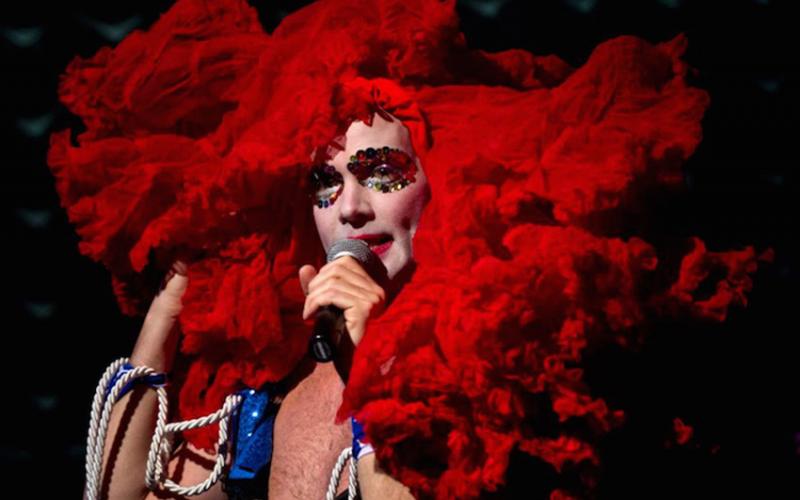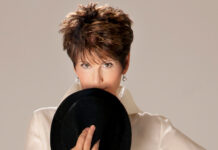Before Taylor Mac returns next year with the full 24 Decade History of Popular Music at the Theatre at the Ace Hotel, take a look a Taylor’s pov on the entire project with an interview I did that posted at LAMag.com in March of 2016:
This July 4, America will turn 240 years old. To celebrate this monumental anniversary, singer/actor/playwright Taylor Mac (who prefers to use “judy†rather than “he†or “she†as the appropriate gender pronoun) has surveyed the popular music from all of those 24 decades, dedicating an hour of performance to each for a total runtime of 24 hours (this is the ambition on which our great nation was built). On Saturday, March 12, judy will perform a segment from the 20th Century portion of the program at UCLA.
“The big thing for me is that the content dictates the form,†Mac says of this mammoth undertaking. “I’m always thinking about what the particular decade is going to be about, what the whole show is about, and then I find songs that work within that theme. The challenge in the early decades is there isn’t that much material that survives that we can pinpoint to the decade. The challenge for the later decades is there’s so much—how do you choose? We are trying to use these popular songs to rally people to a cause, to mourn together, to celebrate together, to love together, to protest together. I try to find the songs that are trying to do something.â€
Mac has long been considered one of the most adventurous performers and playwrights, having received universal praise for a performance in the Public Theatre production of Good Person of Szechwan. The singer also teamed up with Mandy Patinkin in The Last Two People on Earth, which will at some point come to Los Angeles. And Mac’s play Hir just closed after a sold-out run in New York.
Part of the preparations for the full 24-hour version of the show sees Mac performing different segments around the country. “We are work-shopping all these shows and taking them to various places,†judy says. “An act is three decades. I just did Act Seven for the first time in Ann Arbor—1956-1986. This is the Civil Rights Movement and Stonewall and all that kind of stuff. One of the things I talk about in the show is how white guilt stops people from engaging in the conversation of racial inequality. We ignore issues for fear of getting it wrong.â€
During the show Mac takes songs and puts a unique spin on them. “To do these songs and to sing a Bruce Springsteen song and be a raging queer while doing it,†judy says, “that’s enough in some ways. It reframes the history and puts me in it. To do Gimme Shelter, and to frame it like it’s just a shot away, and to talk about Marshall P. Johnson, and throwing the shot glass against a mirror at Stonewall—to take a hetero-normative song and make it a gay liberation doesn’t happen too much. Despite the arguments of historians, we exist and find our way into it.â€
If you’ve ever seen a Taylor Mac show, you know that simply being an observer is not an option. “It’s a like a sporting event or a church,†judy says. “You’re asked to do things. Everyone does the wave, or at church everybody gets up. That’s what we’re doing in these shows. We create, like, a queer church or queer sporting event. It gives us these shared experiences. One of the things I’ve noticed is we don’t have a lot of ritual in our lives if you aren’t into sporting events or church. How do we create ritual with these concerts and make it an alternative to those mainstream institutions?â€
Finding a place at the musical table is not Mac’s only goal with this show. “I create theatre for catharsis,†judy says. “I work in catharsis. That’s my job. That’s the job description. Catharsis can be laughing your ass off. You have to stand up and participate and bring your humanity and vulnerability. I try to get that out of people. So far we’ve been successful. We’re saying, ‘Respond how you want to respond. We are giving you permission to change and to bring yourself to the room.’â€
Despite the perception that audiences have short attention spans and rely on their smart phones for entertainment, Mac doesn’t find that technology encroaches on the shows. “People are craving shared experiences, and it’s so fun,†judy says. “And I think social media has helped the shared experience at the shows. The trick is to make it clear you are in for the ritual of it. That’s what we’re doing. I’m doing this until I can’t do it anymore. Even if it is for 100 people or 1,000 people.â€
UPDATE:Â Next year Taylor Mac will be performing the entire 24 hour cycle at the Theatre at the Ace Hotel as part of the CapUCLA series. Taylor Mac opens at the Curran Theatre in San Francisco, Friday, September 15th.
Photo Credit: The Ace Agency














